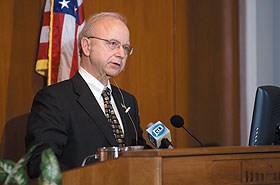  |
| HOME | THIS ISSUE | CALENDAR | GRANTS | BACK ISSUES | < BACK | NEXT > |
Archives vital to democracy, says speaker by Elizabeth Omara-Otunnu - April 14, 2008 | ||||
| Open access to government records plays an essential role in a strong democracy, according to the head of the U.S. National Archives. At the Archives, says Archivist of the United States Allen Weinstein, “we believe that full access to the documents that outline our rights, chronicle the actions of government officials, and record our national experience provides the transparency for a healthy and vital democracy.”
Weinstein made his remarks during the 2008 RBS Greenwich Capital Seminar at the Thomas J. Dodd Research Center on April 2. He said the National Archives provides access to the nation’s records to all: “the scholar researching a book, the veteran seeking information to claim entitled benefits, the genealogist searching for family history, the reporter working on a current news story, the victim of a natural disaster trying to reassemble a life, and the individual citizen interested in the history of this country. All are welcome.” Weinstein traced the origins of today’s National Archives to President Franklin Roosevelt’s founding of the first presidential library in the 1940s. In addition to bringing together the records of the past and housing them in one building, he said, Roosevelt also emphasized the duplication of records using the latest technology at that time, microfilm, so that if original archives were destroyed during wartime, a record would exist somewhere else. Weinstein said that since the 1960s, the Freedom of Information Act (FOIA), a law ensuring public access to government records, has had a huge impact. “FOIA has become the cornerstone of access to governmental records, and as such is pivotal to maintaining a robust democracy,” he said. The National Archives has released a wide variety of records as a result of FOIA, he said: the files of Supreme Court nominees John Roberts and Samuel Alito during their confirmation hearings, for example; official and confidential files of former FBI Chief J. Edgar Hoover; portions of files from independent counsels during the Iran-Contra and Whitewater controversies; and more recently, the scheduling files of former First Lady Hillary Clinton. Weinstein, a former history professor, said the National Archives are indispensable to historians. Records in the Archives document not only the actions of the U.S. government, but also the justifications and deliberations surrounding those actions, he noted: “These records are the lifeblood of historians, who write the story of the nation’s past.” Two years ago, Weinstein said, he learned that thousands of publicly available records had been “quietly removed from the shelves” since 1999. An audit found that more than one third were wrongly reclassified, and that in some cases, unclassified documents were withdrawn to obfuscate the declassified documents that the originating agency was seeking to protect. These actions were a serious threat to the traditions of openness, accessibility, and accountability, Weinstein said, and “must never, never, never be repeated.” Since then, the National Archives has been working to ensure that the improperly removed documents are back on the shelves. Weinstein said digitization has opened up new opportunities for access to archival records. In some cases, original documents are being made available through partnerships with private entities. One such partnership, with Footnote, a subscription-based web service, involves transcribing the 58,000 names on the Vietnam War Memorial and correlating them with military records so they can be searched by name, age, hometown, state, length of service, and unit. The National Archives is also developing its own capability to digitize records, he said, including an initiative known as the Electronic Records Archives (ERA). In the future, the ERA will provide Internet access to the electronic records of the U.S. government, including e-mails, web pages, digital images, databases, and satellite imagery, regardless of the software or hardware used to create them. “The ERA will be our archives of the future, or what some have called our ‘archives without walls’,” he said. The National Archives also works to educate the public about the value of original historic documents, including the creation of a recently completed “family- friendly quasi-museum” in the Archives building in downtown Washington, D.C. “The National Archives,” he said, “is the great undiscovered treasure of Washington.” |
| ADVANCE HOME UCONN HOME |

